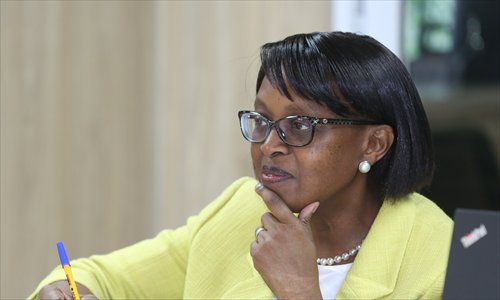China’s health aid to Africa evolves over time

Matshidiso Moeti
Editor's Note:
Dr Matshidiso Moeti from Botswana is the World Health Organization Regional Director for Africa. During her official visit to China, from March 22 to 25, which follows Chinese Health Minister Li Bin's trip to Cape Town for the Ministerial Forum on China-Africa Health Cooperation last October, the Global Times (GT) reporter Yin Lu talked with Moeti, who shared her insights in how China, African countries and the WHO can work together to strengthen Sino-African collaboration in health.
GT: After your visit to China and through meetings with Chinese health leaders, what are some of the new tactics that will be adopted to improve China-African cooperation in health?
Moeti: We held several meetings with Chinese health authorities, including meeting with Li Bin, Minister of Health.
From our discussions, China has vast experience in expanding health services across its population and moving toward universal health coverage. We learnt with interest that the current health protection mechanisms cover over 95 percent of the population.
We want to focus our collaboration in two broad areas: One is health security to increase member states' core capacity for International Health Regulations and establishing emergency operations centers and alert systems.
The other is strengthening health systems toward universal health coverage and equity through infrastructure improvement for better access to and utilization of core health services; improvement of access to quality diagnostics, medicines and treatments for priority diseases, including maternal and child health conditions; technical capacity/expertise to design and implement improved systems; and exchange of staff, attachments and secondments, and building technical networks and communities of practice.
GT: Compared with Western approaches, what role does China play in aiding African countries' health sectors?
Moeti: I think to start with, China has been a partner supporting African countries in health for many decades. China's initial support to African countries was to provide medical teams.
At the time, it provided what China had to provide, which were people, which were health workers, to play a very active role, and really to work in a very integrated way within the healthcare setting in Africa.
And then, as we know, China then developed itself into a giant in terms of manufacturing various things and has a real expertise in infrastructure.
So I think it was very natural that the next stage would be supporting infrastructure building in the African countries, building hospitals.
So in short, I think the Chinese support has been very pragamatically linked to China's capabilities at the time. It is evolving.
Now the discussions that have been taken place in the last two years or so between China and Africa are how to build from this into a broader range of support, which is related to and in line with the health priorities and national health strategies of African countries.
GT: Some Western media call China's aid approaches in Africa a new form of colonialism. What is your take on this?
Moeti: I don't agree personally that it is a kind of colonialism. I think it is a partnership that is different, certainly, from what we sometimes call the "traditional donors," some of whom have relationships with countries that date back to the colonial era when they used to be governing these countries.
I think that it's important to explore different types of partnerships. We've seen China, evolving from sending medical specialists to African countries, while basic healthcare in China was being provided by what they called the "barefoot doctors" in rural areas.
China also has a lot of experience in terms of how the Chinese health system evolved, from being poorly financed when China was a poor country, to a very sophisticated health system where the majority of the population are covered by basic healthcare.
GT: How can China continue to cooperate with African governments and WHO, to further help the local population in the fight against Ebola?
Moeti: China was among the first countries to come out and provide support to African countries affected by Ebola, which included sending out experts, providing equipment, actually helping to establish treatment centers, and sending out laboratories to help out with the diagnoses.
I think China is already working very well with African countries on Ebola, but also more broadly than that.
A few countries who particularly benefited from Chinese help include Cameroon, Ghana, Kenya, Sudan and Zimbabwe. This support has been multi-faceted, with quite a lot of the emphasis on infrastructure, building hospitals, and support in the area of pharmaceuticals, but there is a lot of training and capacity-building that is done by different Chinese health institutions with experts from African countries.
We recall that the weak health systems in these countries played a major role in late detection and inadequate response at the initial stages of the epidemic. Moving forward, emphasis on building more resilient health systems will avoid similar disasters.
Investments to strengthen the International Health Regulations core capacities in line with the Global Health Security Agenda are required. These include the establishment of national emergency operating centers, strengthening surveillance and response capacities through training of staff, provision of equipment and enhancing laboratory capacity.
China is supporting the African Union to establish what is called the African Centers for Disease Control and Prevention. There China is going to work with the US, the European CDC and the WHO to support this institution which will also help in terms of surveillance in different countries, training and capacity building.